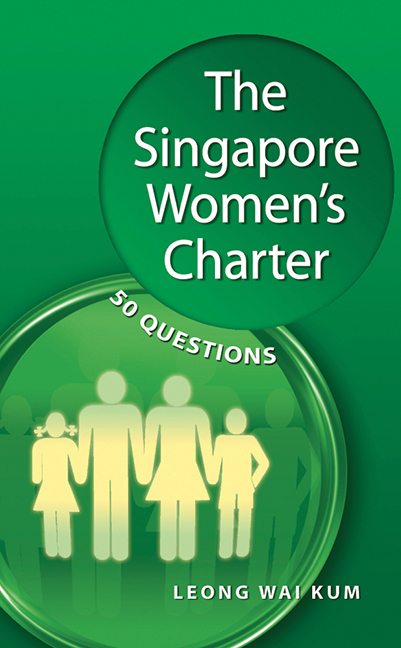Book contents
- Frontmatter
- Contents
- List of Questions
- Foreword
- Preface
- Part I What is the Women's Charter?
- Part II Marriage
- Part III Regulation of Husband-Wife Relationship
- Part IV Regulation of Parent-Child Relationship
- Part V Violence in the Family
- Part VI Divorce and the Process
- Part VII Maintenance
- Part VIII Division of Matrimonial Assets
- Part IX Muslims
- Epilogue
- References
- Index
- About the Author
Part V - Violence in the Family
Published online by Cambridge University Press: 21 October 2015
- Frontmatter
- Contents
- List of Questions
- Foreword
- Preface
- Part I What is the Women's Charter?
- Part II Marriage
- Part III Regulation of Husband-Wife Relationship
- Part IV Regulation of Parent-Child Relationship
- Part V Violence in the Family
- Part VI Divorce and the Process
- Part VII Maintenance
- Part VIII Division of Matrimonial Assets
- Part IX Muslims
- Epilogue
- References
- Index
- About the Author
Summary
What are the legal protections available under the law in Singapore against violence that is inflicted or threatened by a member of one's family?
Criminal offence
Just as it is a criminal offence to use violence on a stranger, it is similarly a criminal offence to use violence on a member of one's family such as a spouse, parent or child. The offender can be reported to the police and charged with offences such as causing hurt, causing grievous hurt, assault, wrongful restraint, criminal intimidation, outrage of modesty, etc.
One exception to this general rule is that parents are allowed some leeway in the use of physical acts of discipline on their children. The law, however, only allows acts that are motivated by the parents’ desire to instil discipline in the child. Parents who punish their child excessively or who are not motivated by a desire to teach their child, ie. parents who inflict violence as an outburst of their own anger towards the child, will have committed a criminal offence under the Penal Code (Chapter 224 of the 2008 Revised Edition of the Statutes of the Republic of Singapore) or the Children and Young Persons Act (Chapter 38 of the 2001 Revised Edition of the Statutes of the Republic of Singapore). An act of violence committed without the intention to correct the child is just as much a criminal offence as any other act of violence.
Inadequate response
The criminal justice system's response to acts of violence by one family member on another may not be sufficient for many reasons.
One shortcoming of the criminal justice response to family violence is that it does not achieve what the victim needs. This victim needs the violence to stop but not the offender (who has or used to have a loving relationship with the victim) to be fined or jailed. The normal criminal sanction may in fact have negative repercussions on the family if the offender is the sole or main breadwinner in the family.
Furthermore, a fine or an imprisonment term does not focus on the root causes that led the offender to inflict violence on the family member. The criminal sanctions punish one act of violence but do not directly help the offender learn to control his poor behaviour towards his family members.
- Type
- Chapter
- Information
- The Singapore Women's Charter50 Questions, pp. 53 - 64Publisher: ISEAS–Yusof Ishak InstitutePrint publication year: 2011



